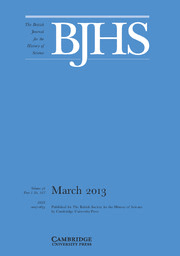
BRITISH JOURNAL FOR THE HISTORY OF SCIENCE
Scope & Guideline
Illuminating the evolution of scientific thought.
Introduction
Aims and Scopes
- Interdisciplinary Historical Analysis:
The journal encourages contributions that integrate various disciplines, including history, sociology, philosophy, and cultural studies, to provide a comprehensive understanding of scientific development. - Focus on Marginalized Narratives:
Emphasizing underrepresented voices and perspectives, the journal often highlights the contributions of women, minorities, and non-Western scholars to the history of science. - Exploration of Science Diplomacy:
A significant area of focus includes the intersection of science and diplomacy, examining how scientific collaboration and competition have influenced international relations. - Cultural Representations of Science:
The journal publishes studies that analyze how science is represented in cultural artifacts, including literature, art, and media, reflecting societal attitudes towards scientific practices. - Historical Contextualization of Scientific Practices:
Contributions often investigate the historical contexts of scientific practices, technologies, and institutions, revealing the socio-political dynamics that have influenced scientific inquiry. - Transnational Histories:
The journal seeks to uncover the transnational dimensions of scientific developments, exploring how knowledge circulates across borders and the implications of these exchanges.
Trending and Emerging
- Climate Change and Environmental Science:
There is a growing emphasis on the historical dimensions of climate change and environmental science, exploring how past scientific practices inform current ecological challenges and policies. - Health and Medicine in Historical Context:
The journal has increasingly focused on the historical exploration of health and medicine, particularly in relation to public health crises, medical practices, and the socio-political dimensions of healthcare. - Science and Technology Studies (STS) Perspectives:
Emerging themes reflect a strong alignment with STS, examining the interplay between science, technology, and society, particularly in the context of contemporary issues such as digital technologies and their societal impacts. - Decolonization of Science:
There is a noticeable trend towards decolonizing the history of science, with an emphasis on non-Western contributions and the impact of colonialism on scientific practices and knowledge systems. - Science and Visual Culture:
Increasingly, the journal publishes works that analyze the intersections of science and visual culture, including how scientific knowledge is represented visually and the implications of these representations. - Public Engagement and Science Communication:
Recent articles have begun to explore the historical aspects of public engagement with science, focusing on how scientific knowledge has been communicated to and perceived by various audiences.
Declining or Waning
- Traditional Biographies of Scientists:
There has been a noticeable decrease in publications centered solely on the biographies of individual scientists, as the field increasingly favors broader contextual analyses over singular narratives. - Purely Technical Histories of Science:
Studies that focus exclusively on technical or methodological advancements in science without considering social implications are appearing less frequently, indicating a shift towards more integrated historical narratives. - Eurocentric Perspectives:
The journal is moving away from Eurocentric frameworks in favor of more global and inclusive approaches, which may lead to fewer articles that center solely on European scientific developments. - Static Representations of Science:
There is a decline in the examination of science as a static body of knowledge; instead, the journal increasingly favors dynamic, evolving narratives that reflect the complexity of scientific practice.
Similar Journals
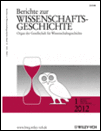
Berichte zur Wissenschaftsgeschichte
Advancing Understanding Through Historical InsightBerichte zur Wissenschaftsgeschichte is a distinguished journal dedicated to the critical exploration of the history of science and its philosophical underpinnings, published by WILEY-V C H VERLAG GMBH in Germany. Since its inception in 1978, this authoritative journal has served as a vital resource for scholars, practitioners, and students alike, contributing to a deeper understanding of scientific developments across historical contexts. The journal holds a respectable Scopus rank in the arts and humanities, placing it in the 79th percentile among history publications and the 56th percentile in history and philosophy of science, marking it as an essential venue for impactful research. Berichte zur Wissenschaftsgeschichte encourages contributions that advance scholarly dialogue and foster an interdisciplinary approach, making it a pivotal platform for the exchange of ideas in the evolving discourse of science history. While it currently does not offer Open Access options, the journal's subscription model ensures that its curated content remains accessible to a global audience dedicated to the interdisciplinary analyses of science's past.

OSIRIS
Illuminating Contemporary Cultural NarrativesOSIRIS, published by the University of Chicago Press, is a distinguished journal focusing on the dynamic intersection of Cultural Studies and the Arts and Humanities. With an established history dating back to 1985, the journal has undergone several converged publication years, reflecting its evolution and commitment to addressing contemporary topics in these fields. OSIRIS holds a reputable position with an impact factor that places it in the Q2 category for Cultural Studies and Q3 for Arts and Humanities (miscellaneous) as of 2023, signifying its influence and scholarly contribution. Researchers and academics will appreciate its rigorous peer-reviewed articles, which aim to advance understanding and foster dialogue around critical socio-cultural issues. While OSIRIS does not currently offer open access, it remains a vital resource for those engaged in the pursuit of knowledge across the arts and humanities spectrum, positioning itself as an essential platform for scholarly discourse from its home base in Chicago, United States.
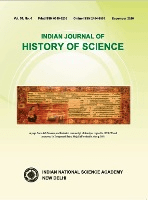
INDIAN JOURNAL OF HISTORY OF SCIENCE
Illuminating India's Scientific Journey Through TimeINDIAN JOURNAL OF HISTORY OF SCIENCE, published by the Indian National Science Academy, offers a vital platform for researchers, professionals, and students dedicated to the exploration of the historical development of science and technology in India and beyond. With the ISSN 0019-5235 and E-ISSN 2454-9991, this peer-reviewed journal aims to promote interdisciplinary collaboration by publishing original research articles, reviews, and discussion papers that highlight the contributions and evolution of scientific thought throughout history. The journal fosters a unique understanding of how historical contexts have shaped current scientific paradigms, making it an essential resource for academic inquiry. Although it does not currently offer Open Access options, the journal's rigorous editorial standards ensure that it maintains a significant impact within the scholarly community, serving as a crucial reference point for historical scholarship in the sciences. Its address in Bahadur Shah Zafar Marg, New Delhi 110 002, India, situates it within a rich tapestry of cultural and academic heritage, further enhancing its significance in the field.
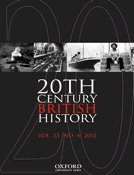
Twentieth Century British History
Bridging disciplines to enrich historical understanding.Twentieth Century British History, published by Oxford University Press, stands as a pivotal scholarly journal in the field of historical research, specializing in the rich tapestry of British history during the twentieth century. With an esteemed impact factor and a notable position within the top Q1 quartile of history journals, it ranks impressively in the Scopus database, securing the 234th position out of 1,760 journals in Arts and Humanities, placing it in the 86th percentile. This rigorous academic platform, active since its establishment in 1990, not only contributes to the sophistication of historical discourse but also encourages interdisciplinary dialogue among historians, sociologists, and cultural studies scholars. Though it does not currently offer open access options, the journal provides invaluable insights, critical analyses, and innovative perspectives aimed at enriching the understanding of Britain’s past and its implications for contemporary society. Researchers, professionals, and students alike will find Twentieth Century British History an essential resource for exploring and appreciating the complexities of modern history.

Metode Science Studies Journal
Unlocking the Complexities of Scientific PracticesMetode Science Studies Journal, published by UNIV VALENCIA, BOTANICAL GARDEN UV, is an esteemed open-access journal dedicated to advancing scholarly discourse in the fields of history and philosophy of science and multidisciplinary studies. Since its inception in 2013, the journal has positioned itself as a vital resource for researchers, professionals, and students, fostering an environment for innovative research and cross-disciplinary dialogue. Based in the vibrant city of Valencia, Spain, this journal aims to publish high-quality articles that explore the intricate relationships between scientific practices and philosophical inquiries. With a current impact factor demonstrating its relevance in the academic community, the journal is indexed in Scopus, ranking in the 52nd percentile for history and philosophy of science and the 33rd percentile for multidisciplinary studies. Scholars can access a breadth of research outputs that span from 2015 to 2024, thereby contributing significantly to the intellectual landscape of the respective fields.

Early Science and Medicine
Revealing the Intersections of Knowledge and HealingEarly Science and Medicine is a renowned academic journal published by BRILL, dedicated to exploring the intersections between historical and medical studies. With a distinguished history since its inception in 1996, the journal caters to an interdisciplinary audience, encompassing vital aspects of History, History and Philosophy of Science, and Medicine. It enjoys commendable rankings, being in the Q2 quartile in History, among others, reflecting its significant contribution to these fields. The journal's editorial commitments aim to advance scholarly discussions on the development of medical practices, theories, and their historical contexts, making it an essential resource for researchers, professionals, and students alike. Although currently not open access, Early Science and Medicine offers comprehensive analyses and rich content that engage with and enrich our understanding of the complex relationship between science and medicine throughout history. For more information, you can find the journal at its esteemed address in Leiden, Netherlands.
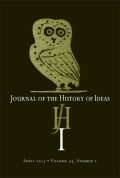
JOURNAL OF THE HISTORY OF IDEAS
Advancing Understanding of Intellectual HistoryJournal of the History of Ideas, published by the University of Pennsylvania Press, is a leading academic journal dedicated to the interdisciplinary exploration of philosophical, cultural, and intellectual history. Since its inception in 1970, the journal has provided a vital platform for scholarly discourse, serving an essential role in the study of ideas that have shaped human thought. With an impressive Q2 ranking in Philosophy and a 75th percentile ranking in the Scopus database, this journal reflects its status as a significant contributor to the field. Although it operates under traditional access options, it remains a crucial source of empirical research and theoretical discussions in the humanities. Researchers, professionals, and students alike will find the Journal of the History of Ideas an invaluable resource for understanding the evolving narratives that inform philosophical discourse and cultural practices. The journal's articles, which are rigorously peer-reviewed and available in both print and digital formats, encompass a broad spectrum of topics, ensuring comprehensive coverage of historical thought from various perspectives up to 2024.
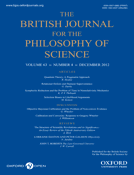
BRITISH JOURNAL FOR THE PHILOSOPHY OF SCIENCE
Shaping the Future of Scientific PhilosophyThe British Journal for the Philosophy of Science, published by University of Chicago Press, stands as a leading journal in the fields of philosophy and history of science. With its ISSN 0007-0882 and E-ISSN 1464-3537, this esteemed publication has been pivotal in advancing philosophical discussions surrounding scientific practice since its inception in 1950. Covering a diverse range of topics and critical analyses, it holds an impressive track record within the academic community, consistently achieving Q1 rankings across several categories, including History, Philosophy, and History and Philosophy of Science. With a Scopus rank placing it in the top percentiles of its respective fields, the journal is recognized not only for its academic rigor but also for its role in shaping contemporary philosophical discourse. While it is not an open-access journal, the British Journal for the Philosophy of Science provides essential insights and fosters critical thinking, making it an indispensable resource for researchers, professionals, and students dedicated to the nuanced interplay between science and philosophy.

British Catholic History
Charting the Journey of Faith in British HistoryBritish Catholic History is an esteemed journal published by Cambridge University Press, focused on the rich and complex narrative of British Catholicism from the late medieval period to contemporary times. With its ISSN 2055-7973 and E-ISSN 2055-7981, this journal provides a dynamic platform for scholars, researchers, and students in the fields of History and Religious Studies. Despite its current ranking in Q4 quartiles for both categories as of 2023, the journal holds significant merit with Scopus rankings placing it at percentiles of 63rd in Religious Studies and 61st in History, which reflects its contribution to the deeper understanding of religious influences in historical contexts. Established in 2015, it seeks to publish high-quality research articles, reviews, and discussions that illuminate the intersection of culture, faith, and historical events in the UK. Although currently not an open-access journal, it remains a pivotal resource for those seeking to expand their knowledge and engage with the evolving narratives of British Catholic history.
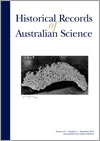
Historical Records of Australian Science
Documenting Milestones in Scientific Discovery.Historical Records of Australian Science is a premier academic journal published by CSIRO PUBLISHING, focusing on the rich legacy and contributions of Australian science from its inception to contemporary advancements. The journal is integral to the Arts and Humanities and Social Sciences fields, operating within a unique niche that fosters interdisciplinary dialogue and research. With its ISSN 0727-3061 and E-ISSN 1448-5508, it encompasses a diverse scope spanning historical analysis, philosophy of science, demography, and human factors. Although it is currently categorized into Q3 and Q4 quartiles across various relevant spheres in 2023, the journal strives for excellence in archiving pivotal scientific milestones as it continues to publish valuable insights, encouraging submissions from scholars globally. Its commitment to enriching scholarly discussion makes it a crucial resource for researchers, professionals, and students keen on exploring the historical narratives that have shaped Australia’s scientific landscape. With a convergence of knowledge from 1980 through to 2024, the Historical Records of Australian Science stands as a vital repository for those delving into Australia’s scientific heritage.